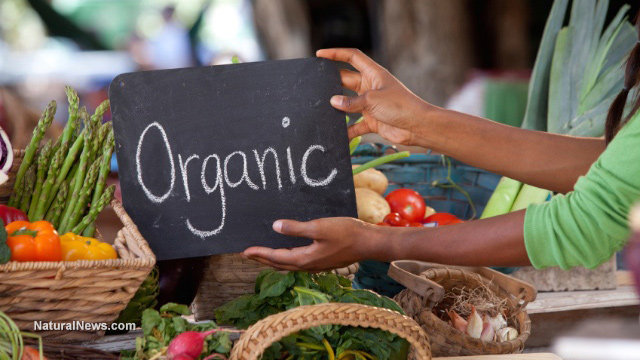
Market for organic products continues to expand as consumers ditch unhealthy products
Friday, March 22, 2019 by Amy Goodrich
http://www.products.news/2019-03-22-market-for-organic-products-continues-to-expand.html

With a growing community of people who take their family’s health seriously, organic sales are reaching an all-time high. “Free-from” foods are products that do not contain ingredients known to cause allergic reaction or intolerances. Next to higher demands for clean, organic products, foods and beverages that are promoted as free from gluten, sugar, peanuts, and other allergens or natural properties are on the rise, too.
The booming U.S. organic food and beverage industry recently posted new records. In 2016, total organic food and beverage sales went up by 6.8 percent to reach $36 billion, while free-from product sales increased by 7 percent to reach $32 billion, according to new health and wellness industry data from a global market research company Euromonitor International.
“Free-from” and “organic,” the fastest growing health and wellness trend
In a news release, Ewa Hudson, head of health and wellness at Euromonitor International, explained that the growth in organic and free-from food sales has boomed in 2016 because consumers are reading labels more carefully while seeking natural ingredients and looking for foods that represent a “guilt-free” purchase.
And sales are still going up as we speak since the organic, clean food trend keeps growing in popularity every day. According to the news release, free-from and organic foods and beverages are expected to hit $833 billion in sales by 2021. One of the fastest growing categories in Asia Pacific, Latin America, Europe, and North America are the lactose-free and hypoallergenic options, which are set to generate an additional $9.5 billion in sales by 2021.
According to Ewa Hudson, a clear statement that combines health, convenience, elegant packaging, and affordable price is the winning strategy behind the increasing health and wellness developments. She added that before the free-from boom, gluten and lactose-free options were the opposite of convenient. Consumers had to either avoid certain foods or cook all their meals from scratch. The rise in popularity has brought convenient foods to these categories and a host of opportunities to grow the market. Furthermore, she said that in the near future it is unlikely that the popularity of organic foods is going to fall out of favor since organic foods and beverages are also in sync with the growing natural and clean label trend.
Since it is no longer a secret that big food corporations are trying to make us addicted to their sugar-, fat-, and chemical-laden Frankenfoods, millions of people worldwide are ditching these unhealthy products to make their family’s health and happiness a priority.
Organic farming on the rise, too
With organic sales going through the roof, more and more farmers are transitioning to organic growing methods to meet the rising demand. Even though transitioning to organic crops usually comes with a greater cost and crop loss, the increased interest is a logical consequence of the world evolving towards healthy, safe, and clean foods.
Only recently, Natural News reported on how Colorado farmers are working hard to make the transition to less profitable organic farming methods to meet the growing demand for organic products. In the past three years, Colorado’s organic agricultural industry has more than doubled its sales. It is only a matter of time before the rest of the world will pick up on these organic farming techniques to meet global consumer needs.
Though it may come with a higher cost, a lot of research is going into the improvement of natural cultivation methods that reduce cost and crop loss. Furthermore, farmers who are willing to make the switch can usually rely on financial programs to get them up and running. In 2016, The Organic Trade Association (OTA), which unites and serves more than 8,500 organic farmers, handlers, ranchers, processors, distributors, and retailers, saw the biggest growth in OTA memberships in over five years.
Sources include:
Tagged Under: Tags: clean food, consumer goods, food safety, food trend, goodfood, goodhealth, non-GMO, organic farming, organic food industry, organic trend, organics





